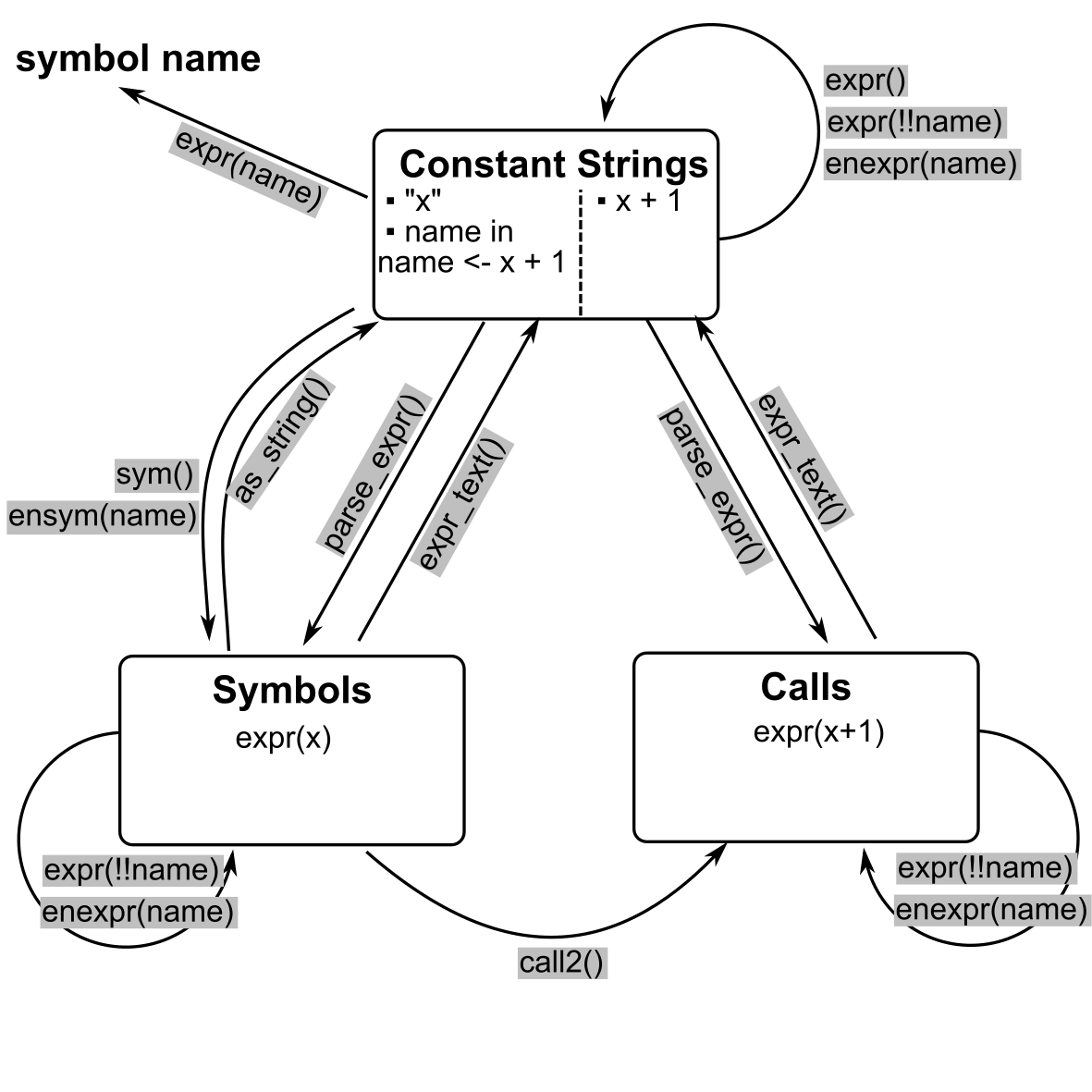Non-standard evaluation (NSE) is a cornerstone of tidyverse packages like dpylr and ggplot2. It enables R to generate code systematically and evaluates it in a specific environment.
Generating code is based on expressions. As what documented in AdvanceR Chap18.1, expressions are implemented to
separate our description of the action from the action itself.
Expressions are created using rlang::expr() and they mainly include
- constant:
rlang::is_syntactic_literal()is TRUE. Only character vector will be discuss here since both “description of the action” and “action itself” are generally generated from string. Therefore,strreturnschr. - symbol:
strreturns "symbol andrlang::is_symbol()is TRUE and - call:
strreturns “language” andrlang::is_call()is TRUE. (AdvanceR Chap18.3.4 summary)
This post explores what are them and how to convert among them using functions in rlang packagehttps://cran.r-project.org/web/packages/rlang/index.html, aiming to nail down those jaggons in a more intuitive way. To this end, I characterized functions based on input/output, although they might be some nitty-gritty details for choosing one function over the other in a specific context.
I defined two sets of testing variables, each corresponds to a type of strings: the first set is single object that could be used as a name of an object; the second set contains operators that could be parse as a function call. Each set consists of expression of a string, string itself and expression of unquoted.
so <- expr("x") # single string expression
ss <- "x" # single string
se <- expr(x) # single unquoted expression
fo <- expr("x + 1") # function string expression
fs <- "x + 1" # function string
fe <- expr(x + 1) # function expressionHere I will show the following conversion rules using examples. A flow chart summarises the conversion rules.

Constant strings are self quoting.
so == ss # expr("x") == "x"## [1] TRUEfo == fs # expr("x + 1") == "x + 1"## [1] TRUECaptured expression depends on input.
str(se) # se <- expr(x)## symbol xstr(fe) # fe <- expr(x + 1)## language x + 1Capturing the name of captured expression is useless.
str(expr(se)) # symbol se## symbol sestr(expr(fe)) # symbol fe ## symbol feBoth unquoting and enriched expression could recover quote.
expr(!!ss) == enexpr(ss) # == "x"; chr "x"## [1] TRUEexpr(!!se) == enexpr(se) # == expr(x); symbol x## [1] TRUEexpr(!!fs) == enexpr(fs) # == "x + 1"; chr "x + 1"## [1] TRUEexpr(!!fe) == enexpr(fe) # == expr(x + 1); language x + 1## [1] TRUEParsing a string, not a call, to a call.
str(parse_expr(ss)) # symbol x## symbol xparse_expr(ss) == se # TRUE## [1] TRUE# parse_expr(se) # error: must be a character vector, not symbol
str(parse_expr(fs)) # language x + 1## language x + 1parse_expr(fs) == fe # TRUE## [1] TRUE# parse_expr(fe) # error: must be a character vector, not function callcall2() is another way to construct function from symbols
call2("+", expr(x), 1) == fe ## [1] TRUEensym()/sym() converts string to symbol but not to call.
str(ensym(ss)) # == sym("x")## symbol xstr(ensym(se)) # == sym(expr(x))## symbol xstr(ensym(fs)) # == sym("x + 1")## symbol x + 1# str(ensym(fe)) # == sym(expr(x + 1)) # errorparse_expr() and deparse() are not perfectly symmetric, but expr_text might be better?
(symbol <- ensym(fs))## `x + 1`str(symbol)## symbol x + 1(call <- parse_expr(deparse(symbol)))## x + 1str(call)## language x + 1(call <- parse_expr(expr_text(symbol)))## `x + 1`str(call)## symbol x + 1